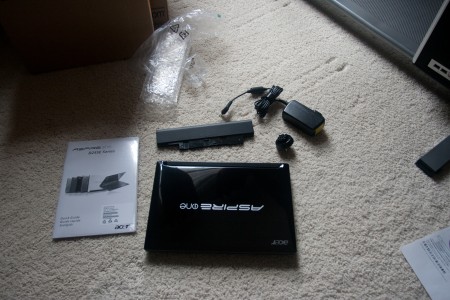Top 200 Photos: #135
Back to Cornell for this Top 200 Photo.
I took the source photo for this on the footbridge that leads to College Town. Then I threw it into Photoshop and started messing around. I arrived at this look by accident, but I really liked it.
May 2011 Background Calendar
This month’s calendar is from Rehoboth Beach in Delaware. The Dolles Salt Water Taffy place is in nearly all the postcards and other media for the city.
[caption id=“attachment_4375” align=“aligncenter” width=“400” caption=“May 2011 - 1024x768 for Square Monitors”]  [/caption]
[/caption]
[caption id=“attachment_4376” align=“aligncenter” width=“480” caption=“May2011 - 1680x1050 for Widescreen Monitors”]  [/caption]
[/caption]
Top 200 Photos: #136
An avian photo for today’s Top 200 Photo.
I enjoy all the birds in my backyard, but nothing beats the thrill of identifying a new bird. It’s hard to get a good enough shot to be able to ID it because enough birds look similar enough that it can be hard for the novice birder to identify them.
Top 200 Photos: #137
Another 365 entry for today’s Top 200 Photo.
I got this idea during the swine flu epidemic. I’d heard that some people in less-educated countries were afraid that you could actually catch the swine flu from pigs. The truth was a bit more complicated - the original strain that could infect humans did come from a pig. But that was just one mutation of the virus. It only existed in that one pig. But people were boycotting having pigs in zoos and all kinds of stuff. So I thought of this idea. The title is “You Told Me You Were Clean”
Top 200 Photos: #138
Back to DC for today’s Top 200 Photo.
I mentioned Tai Shan before. This is his father, Tian Tian. My wife is always expressing how pandas should be extinct already from having such a dumb diet. They eat bamboo, but it is so nutrient deficient that they essentially have to eat non-stop or they will end up actually losing weight by just laying around and being alive.
Top 200 Photos: #139
No #140 because it was already covered. As I write this, photo #140 has 416 views and photo #121 has 459 views. So they’re still close enough that just one view can cause a photo to jump 3 or more spots up.
Another boring night in Maryland. Another cool photo with the wife. I had been reading a book of famous photographers and there was this one guy who took photos of beautiful women, but always framed the shot so that he would be reflected in a mirror. So I decided to go with that. Danielle decided to play with kimonos Dan had brought back from his trip to Japan and put on some makeup so I could take photos. I think my favorite aspect of the photo is her half smile.
Ubuntu to the Rescue: A Tale of Broadcom Wifi Drivers, Prerelease Software, and a new Acer Aspire One Netbook
note: I wrote this on 17 April, a full week before it is published on the blog
[caption id=“attachment_4398” align=“aligncenter” width=“450” caption=“Acer Aspire One - out of the box”]  [/caption]
[/caption]
Nearly six years ago I bought my first laptop. I’d never seen the point of laptops over desktops - the value per dollar just isn’t there. But I was going to be traveling for work now and again and needed to be able to get in contact with the family while away. I got an old Acer that was on sale at best buy because it was the last one left. A year after buying that laptop, netbooks came out. I got my wife one of the first Asus EEE PCs because she was going on a work trip didn’t want to haul my heavy laptop around. So for the past few years we’ve traveled with both of those so I can use my laptop to watch my movies and she can use her netbook to watch hers. But I’m getting tired of that heavy laptop and now netbooks aren’t saddled with crippled versions of Linux and inferior hardware. So I got myself a new Acer Aspire One from Amazon. I’d seen the same one at Costco for $50 more (because it has double the battery life) and I’d wanted to get it for a while now. I’m going to be traveling to Chicago for a trip soon, and since my back has been giving me issues, I figured it was the time to go to a lighter laptop.
Mid-April Photojojo
Time again for my photojojo time capsule. It contains my most interesting photos within a two week period. This time around it’s mostly my 365 plus one of my first Holga photos.
An Open Plea for Sanity to Amazon and Valve
Dear Amazon and Valve,
I write this to you because you are the largest and most powerful companies in your ecosystems. The digital world has become ridiculous and you need to be leaders in rectifying the situation. Let’s start with Amazon. The two biggest digital things you sell are books and music. Back in the analog world before commerce became a Wonderland distortion, if I bought a book or CD, any member in my household could access this item. It didn’t matter if I bought the book or my wife bought the book. We could both read it. The same went with a CD. Either of us could grab the CD off the shelf and put it into our portable CD player. But now go to the Kindle (or any other e-reader system) and Amazon CloudPlayer. Sure, either of us could pick up the e-reader to read a book. But what if we both want to read a different book at the same time. How can we access each other’s libraries? What about if we each want to listen to the same music library from Amazon CloudPlayer on our smart phones or other devices? For various reasons, like Amazon recommendations, it makes sense for us to have different accounts instead of a family account.
KDE: Strength in Abstraction
I have not yet tried out Gnome Shell or Ubuntu Unity, but the biggest complaint most people level against them is that our desktops are being tablet-ified. Sure, there need to be new, innovative interfaces for tablets and phones, but that’s no reason to abandon the desktop. Sure, perhaps the average Joe (or Jane) will be using tablets more and more, but some of us have real work to get done. We need to do photo editing, programming, video editing, 3D modeling, and other tasks that require something more than a glorified smart phone. This is where KDE excels.







